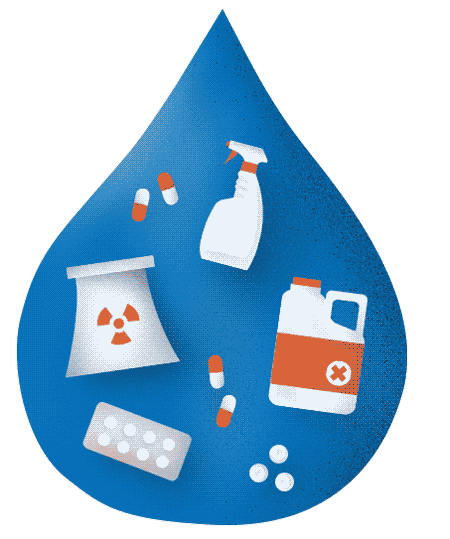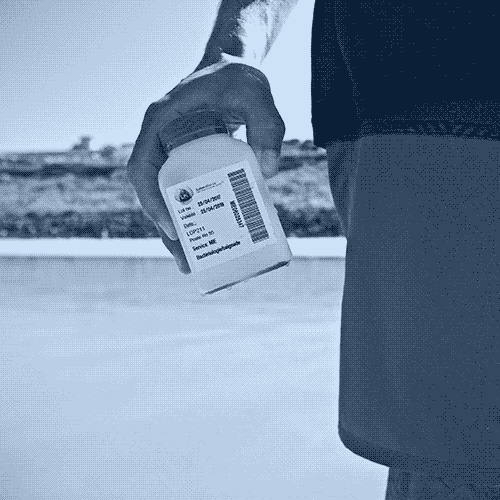
Chemical pollution is one of the most insidious threats to the ocean, lakes, rivers and all of our aquatic ecosystems. Invisible to the naked eye but omnipresent, it infiltrates our aquatic environments in many ways and compromises the health of ecosystems as well as human populations.
Chemicals are omnipresent in our lifestyles, production and consumption patterns, and this omnipresence leads to widespread pollution. All sources of chemical contamination converge in our surface waters! Intensive agriculture discharges pesticides, fertilisers and nitrates into the soil and waterways. Domestic and cosmetic products, rich in micropollutants such as surfactants, endocrine disruptors and preservatives, enter the sewage system. Industrial discharges release heavy metals and complex chemicals, while drug residues, particularly antibiotics that promote antibiotic resistance, contaminate wastewater.
Maritime transport also contributes to this pollution through degassing and antifouling paints, not to mention urban rainwater laden with multiple contaminating particles, which completes this worrying picture.
These persistent and harmful substances accumulate in aquatic organisms and gradually undermine the balance of marine ecosystems. Their insidious nature lies in their ability to cause long-term damage, often imperceptible at first but with dramatic consequences for aquatic biodiversity.
Prevention at source: an absolute priority
While the issue has long centred on the inability of current treatment plants to effectively remove these micropollutants, the approach now needs to change radically. Although efforts have long been made to eliminate these substances by gradually upgrading treatment plants, the most effective solution to combat chemical pollution of surface waters remains to prevent micropollutant emissions at source.
Faced with this reality, the European regulatory framework is proving inadequate. Existing directives largely neglect chemical micropollutants, setting overly permissive thresholds and ignoring cocktail effects and emerging contaminants. Above all, preventive measures at source are insufficient to tackle the scale of this pollution! Surfrider Foundation is firmly committed to filling these gaps by working to improve scientific knowledge on chemical pollution in surface waters and influencing European policies towards more ambitious regulation. Because protecting the ocean from this invisible threat means preserving both aquatic biodiversity and our own health.
Our approach and requirements

1.
Strengthening measures to prevent
chemical pollution in the marine environment
Surfrider Foundation Europe is developing an integrated approach that recognises the fundamental interconnection between ocean health and human health.
For more than 20 years, the association has been working to improve the quality of European waters as part of its ‘Healthy Waters’ campaign. Faced with the chemical crisis threatening our marine ecosystems, we call for a move beyond the compartmentalised vision that traditionally separates environmental and health issues.
The association favours a preventive strategy that tackles the causes rather than the consequences of chemical pollution: the priority today is to reduce emissions of hazardous substances throughout the life cycle of chemicals.
In addition, and to support the transition to non-toxic production and consumption patterns, the strict application of the polluter pays principle seems to be an good lever to encourage companies to abandon the use of harmful substances.
Surfrider Foundation Europe calls for the interface between science and policy to be strengthened by improving monitoring practices and access to environmental data.
The association promotes the development of participatory science projects involving citizens and stresses the importance of ensuring an inclusive decision-making process that involves civil society.
Read the report: Toxic tides: confronting the chemical crisis
2.
Taking collective action to review chemical pollutants
Faced with the scale of the challenges posed by marine chemical pollution, Surfrider Foundation Europe is committed to a collaborative approach, working closely with other European NGOs on the revision of the list of priority chemical pollutants at European level.
This coalition of NGOs shares a common vision: the urgent need to update regulatory frameworks to include emerging chemicals and better address the risks associated with mixtures of pollutants.
Collective action allows them to present a united front on public health and marine ecosystem protection issues, demonstrating that concern about chemical pollution transcends national and organisational boundaries.
This collaborative strategy is particularly relevant in a context where chemicals know no geographical boundaries and their impact requires a coordinated response at European level.
3.
Insist on a revision of the Bathing Water Directive
Surfrider Foundation Europe is actively campaigning for an ambitious revision of the Bathing Water Directive, which it considers inadequate in light of current health and environmental challenges.
As a member of the European expert group on bathing water quality monitoring, the association submitted a manifesto to the European Commission in 2021 highlighting seven major shortcomings in the current text, which was adopted in 2006.
Surfrider criticises the assessment of water quality based only on two bacteriological criteria, which are monitored during the summer season and limited to official bathing areas. This approach ignores the millions of people who enjoy water sports (surfing, paddleboarding, snorkelling) all year round outside these monitored areas, as well as the new pollutants that threaten their health: chemical contaminants (hydrocarbons, drug residues, pesticides, PFAS), microplastics, cyanobacteria and toxic algae.
The association is calling for the integration of new monitoring parameters including chemical pollution of surface waters, harmonisation with other European water directives, year-round monitoring, and mandatory corrective measures at source rather than simply closing sites.
Surfrider is also calling for better public information and greater citizen participation in monitoring water quality.
Faced with the European Commission’s recent refusal to open a review, despite an evaluation report that largely validates its recommendations, Surfrider is continuing its campaign for a directive that truly protects the ocean and the health of Europeans, incorporating the ‘One Health’ approach, which recognises the indivisibility of human health, animal health and environmental protection.
Read the report: Manifesto for Bathing and Recreational water quality in Europe
4.
Maintaining pressure for responsible wastewater management
Surfrider Foundation Europe is actively involved in the revision of the Urban Waste Water Directive (UWWD), a European text that has governed the collection and treatment of wastewater since 1991. Faced with the obsolescence of a directive that is more than 30 years old, the association seized the opportunity of the public consultation launched by the European Commission in 2020 to mobilise its community and formulate recommendations aimed at limiting surface water pollution from wastewater.
Urban wastewater, which comes from households, certain industries and urban runoff, carries a multitude of chemical pollutants (pharmaceutical residues, cleaning products, cosmetics), pathogenic bacteria and microplastics that wastewater treatment plants are not always equipped to treat effectively. This contaminant-laden water eventually flows into rivers and then the ocean, endangering aquatic ecosystems and the health of users of coastal bathing areas.
The association particularly emphasised the need to integrate quaternary treatment to eliminate chemical micropollutants in as many wastewater treatment plants as possible, maintaining the threshold of 100,000 inhabitants initially proposed by the Commission.
Surfrider also strongly defended the full application of the polluter pays principle. Unfortunately, EPR is currently facing a significant threat. The pharmaceutical and cosmetics lobbies are leading an offensive to challenge this system of responsibility, which has already been watered down. This industrial mobilisation aims to further reduce their financial obligations, even though their products are the main source of micropollutants found in wastewater. Surfrider calls on European decision-makers to resist this pressure and to firmly maintain the adopted framework. The protection of the ocean and public health cannot be sacrificed to the economic interests of industries that must assume their environmental responsibility.
The new version of the DERU, adopted after more than two years of negotiations between European institutions, represents a significant step forward but has provoked mixed feelings within Surfrider.
The association welcomes several significant advances, notably the historic victory concerning the official recognition of pollution caused by biomedia – the result of the tireless work of its experts, lobbyists and volunteers. For the first time, a European regulation precisely defines biomedia and requires Member States to establish a database of stations using these plastic media, as well as monitoring and prevention obligations.
The introduction of quaternary treatment to remove micropollutants in large stations is also a major step forward, as is the recognition of the impact of stormwater overflows and the introduction of extended producer responsibility for the pharmaceutical and cosmetics industries.
However, Surfrider regrets that several initial proposals have been watered down under pressure from industrial lobbying, that the stormwater management plans are non-binding, and that the implementation deadlines are too long, with multiple possibilities for derogations.
Alongside its advocacy work, Surfrider has set up a citizen-led network to monitor the bacteriological quality of coastal waters. This initiative, which combines scientific rigour with civic engagement, makes it possible to extend surveillance of at-risk areas and identify sources of contamination by pathogenic bacteria. The data collected by trained volunteers is used to inform the public, alert them to contaminated areas and guide local environmental policies.
Despite its reservations about the ultimate ambition of the text, Surfrider recognises that the new directive is an essential tool and roadmap for combating pollution of the aquatic and marine environment in the coming decades. The association calls on European decision-makers to ensure the text comes into force quickly and continues to campaign for ambitious implementation that will effectively protect the ocean and the health of its users.
going further
